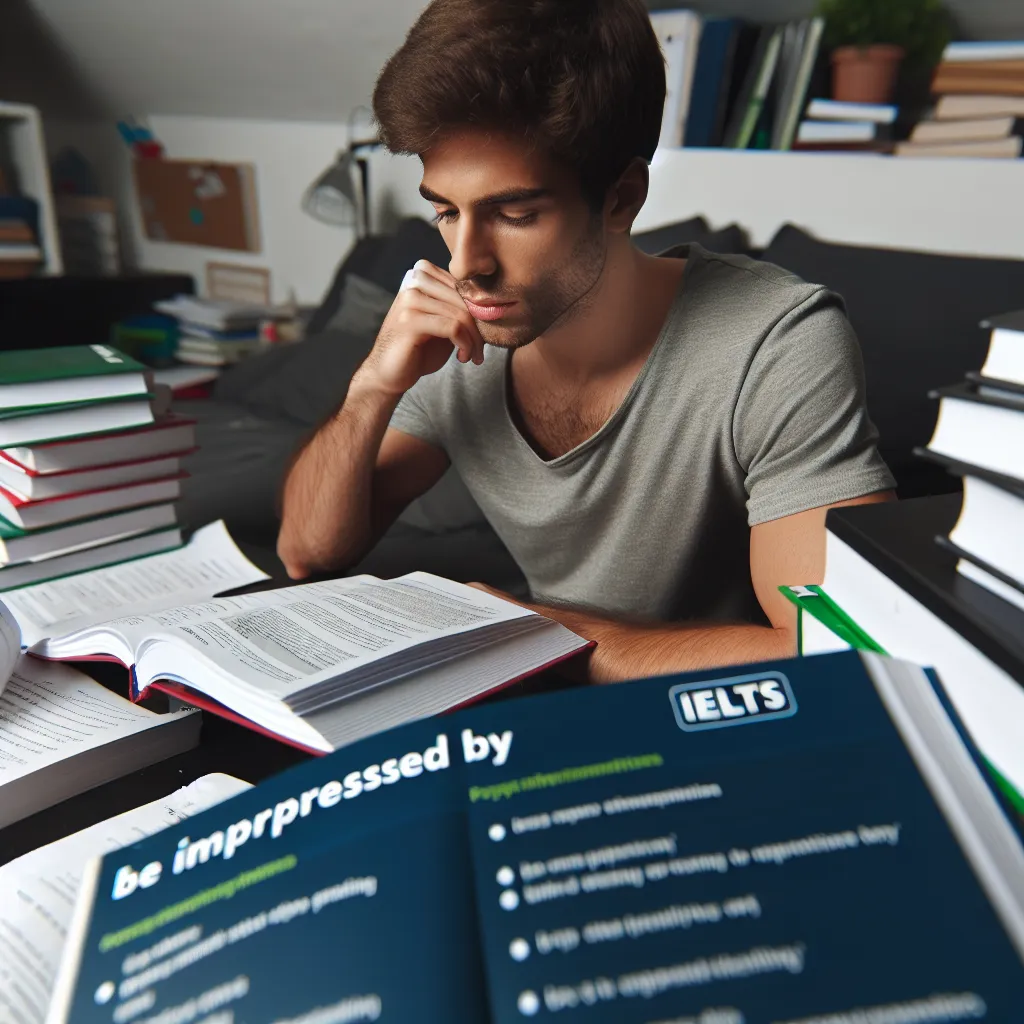The “be impressed by + noun/gerund” structure is a powerful tool for expressing admiration or appreciation in English. It’s particularly useful in IELTS exams, where candidates need to articulate their thoughts and feelings effectively. Let’s dive into this structure and explore how to use it to boost your IELTS score.
Understanding the Structure and Its Importance in IELTS
The structure “be impressed by + noun/gerund” is commonly used to express a positive reaction or feeling towards something or someone. It’s a versatile phrase that can be applied in various contexts, making it valuable for both IELTS Writing and Speaking tasks.
Examples:
- I was impressed by her eloquent speech.
- The judges were impressed by the contestant’s singing ability.
- Many tourists are impressed by the city’s architectural beauty.
- Employers are often impressed by candidates who show initiative.
- We were impressed by the team’s dedication to the project.
In these examples, the structure allows for clear and concise expression of admiration, which is crucial for achieving higher band scores in IELTS.

Grammar Formula and Analysis
The basic formula for this structure is:
[Subject] + [be verb] + impressed + by + [noun/gerund]
Let’s break it down:
- Subject: The person or thing experiencing the feeling of being impressed
- Be verb: Conjugated according to the subject and tense (am/is/are/was/were)
- Impressed: The adjective expressing the feeling
- By: The preposition linking the feeling to its cause
- Noun/Gerund: The thing or action that causes the feeling of being impressed
This structure can be used in various tenses:
- Present: I am impressed by your dedication.
- Past: They were impressed by the presentation.
- Present Perfect: We have been impressed by the team’s progress.
- Future: I’m sure they will be impressed by your skills.
Application in IELTS Writing and Speaking
IELTS Writing Task 2
In Writing Task 2, using this structure can help you express opinions and describe reactions effectively. For example:
“Many people are impressed by the rapid technological advancements in recent years. However, some are more impressed by the simpler aspects of life, such as nature and human relationships.”
This introduction sets up a contrast using the structure twice, demonstrating good grammar control and vocabulary range.
IELTS Speaking Part 2
In a topic about describing a person you admire, you could say:
“I’ve always been impressed by my grandfather’s wisdom. What really stands out is how he approaches problems – I’m continually impressed by his ability to stay calm under pressure and find creative solutions.”
Using this structure in speaking shows fluency and the ability to express admiration naturally.
Advanced Usage for Higher Band Scores
To aim for higher band scores (7+), consider these advanced applications:
-
Combine with other structures:
“Not only was I impressed by her technical skills, but I was also struck by her leadership abilities.” -
Use in passive constructions:
“The audience was left impressed by the intricate choreography.” -
Incorporate adverbs for emphasis:
“I was particularly impressed by the attention to detail in the report.” -
Use in hypothetical situations:
“If implemented correctly, citizens would be impressed by the new urban planning initiative.” -
Combine with idiomatic expressions:
“The critics were blown away, thoroughly impressed by the director’s innovative approach.”
These advanced uses demonstrate a high level of grammatical control and vocabulary, key factors in achieving higher band scores.
Common Mistakes to Avoid
-
Incorrect preposition:
Incorrect: “I am impressed with her skills.”
Correct: “I am impressed by her skills.” -
Using the wrong form after “by”:
Incorrect: “They were impressed by to see the results.”
Correct: “They were impressed by seeing the results.” -
Forgetting to conjugate “be”:
Incorrect: “He be impressed by the performance.”
Correct: “He was impressed by the performance.” -
Overusing the structure:
While it’s a useful phrase, overusing it can make your speech or writing repetitive. Vary your language with synonyms like “amazed by,” “in awe of,” or “struck by.” -
Misusing tenses:
Incorrect: “I am impressed by the movie I watched last night.”
Correct: “I was impressed by the movie I watched last night.”
Conclusion
Mastering the “be impressed by + noun/gerund” structure can significantly enhance your IELTS performance. It allows for clear expression of admiration and appreciation, which is valuable across various IELTS tasks. Remember to practice using this structure in different contexts and tenses to improve your fluency and accuracy. As you prepare for your IELTS exam, try incorporating this structure into your practice essays and speaking exercises, paying attention to the nuances and avoiding common mistakes. With consistent practice, you’ll find yourself confidently using this structure to express your thoughts and opinions, potentially boosting your IELTS score.
For further practice, try using this structure to describe impressive aspects of your hometown, a memorable event, or a person you admire. These are common IELTS topics where this structure can be particularly effective.